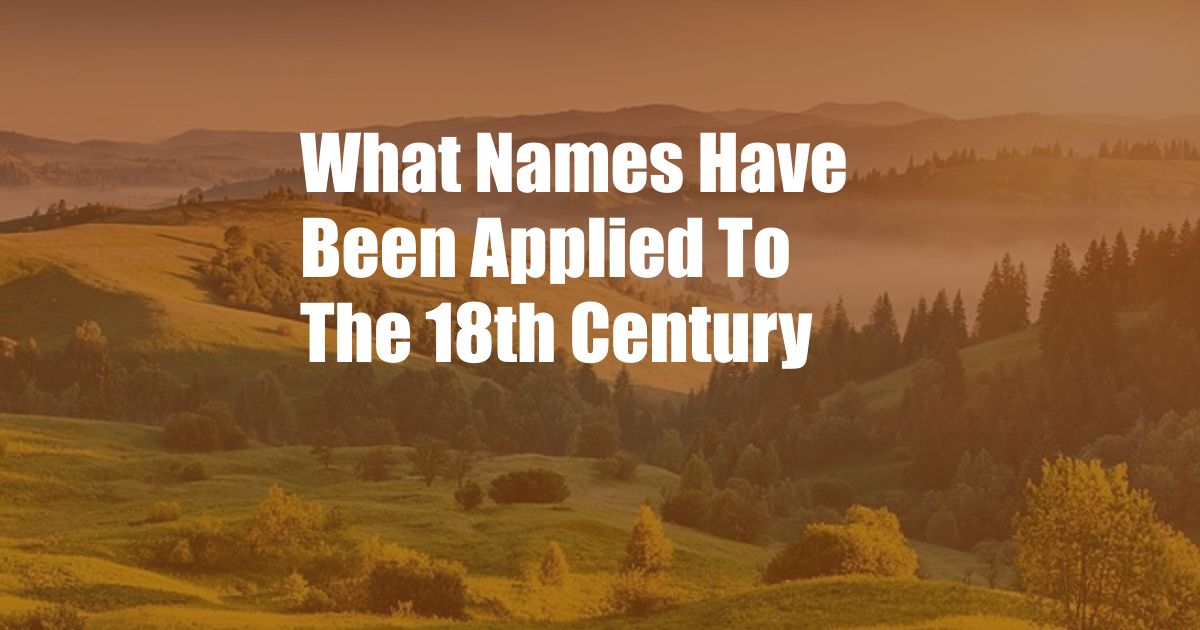
The Many Names of the 18th Century
As a history buff, I’ve always been fascinated by the 18th century. It’s a period of immense change and transformation, when the world began to take on the modern shape we recognize today. But one thing that has always puzzled me is the sheer number of names that have been applied to this era. From the “Age of Enlightenment” to the “Long Eighteenth Century,” from the “Ancien Regime” to the “Age of Revolutions,” it seems like every historian has a different way of describing this pivotal time.
In this article, we’ll explore the different names that have been given to the 18th century and delve into the meanings behind them. We’ll also discuss the latest trends and developments in 18th-century studies, and offer some tips for further exploration.
The Age of Enlightenment
Perhaps the most common name for the 18th century is the “Age of Enlightenment.” This term refers to the intellectual and cultural movement that swept through Europe during this period. Enlightenment thinkers believed in the power of reason and science to improve society, and their ideas laid the foundation for many of the revolutions that would follow.
Some of the most famous Enlightenment thinkers include Voltaire, Rousseau, and Diderot. Their writings challenged traditional authority and promoted the ideals of liberty, equality, and fraternity. The Enlightenment also had a profound impact on art, literature, and music, leading to the development of new styles and genres that reflected the changing times.
The Long Eighteenth Century
Another common name for the 18th century is the “Long Eighteenth Century.” This term refers to the period from 1688 to 1815, which historians argue represents a distinct era in European history. The Long Eighteenth Century was a time of great political, economic, and social change, and it saw the rise of new powers like Britain and France.
The Long Eighteenth Century also saw the development of new technologies and industries, as well as the growth of cities and the spread of literacy. It was a time of both progress and upheaval, and it laid the foundation for the modern world we live in today.
The Ancien Regime
The term “Ancien Regime” refers to the political and social system that existed in France before the French Revolution. The Ancien Regime was characterized by a rigid class structure, with the nobility and clergy at the top and the peasantry at the bottom. The monarchy was absolute, and there was little political or social mobility.
The Ancien Regime was increasingly unpopular in the 18th century, as the Enlightenment ideas of liberty and equality began to take hold. The French Revolution of 1789 overthrew the Ancien Regime and established a new republic.
The Age of Revolutions
The 18th century was a time of great political upheaval, with revolutions breaking out all over the world. The American Revolution, the French Revolution, and the Haitian Revolution were just a few of the many revolutions that took place during this period.
These revolutions were inspired by the Enlightenment ideals of liberty, equality, and democracy. They led to the overthrow of old regimes and the establishment of new governments based on the consent of the governed. The Age of Revolutions had a profound impact on the world, and it shaped the political landscape that we still live in today.
Tips for Further Exploration
If you’re interested in learning more about the 18th century, here are a few tips:
- Read books and articles by historians who specialize in the 18th century.
- Visit museums and historical sites that focus on the 18th century.
- Watch documentaries and movies about the 18th century.
- Join online discussion forums and social media groups about the 18th century.
By following these tips, you can deepen your understanding of this fascinating period in history.
FAQ
Q: What is the most common name for the 18th century?
A: The most common name for the 18th century is the “Age of Enlightenment.”
Q: What is the “Long Eighteenth Century”?
A: The “Long Eighteenth Century” is the period from 1688 to 1815, which historians argue represents a distinct era in European history.
Q: What was the “Ancien Regime”?
A: The “Ancien Regime” was the political and social system that existed in France before the French Revolution.
Q: What was the “Age of Revolutions”?
A: The “Age of Revolutions” was a time of great political upheaval, with revolutions breaking out all over the world in the 18th century.
Conclusion
The 18th century was a time of great change and upheaval, and it has been given a variety of names to reflect its different aspects. From the Age of Enlightenment to the Long Eighteenth Century, from the Ancien Regime to the Age of Revolutions, each name captures a different facet of this fascinating period in history.
If you’re interested in learning more about the 18th century, I encourage you to explore the resources available online and in libraries. There is a wealth of information out there, and I’m confident that you’ll find something that interests you.